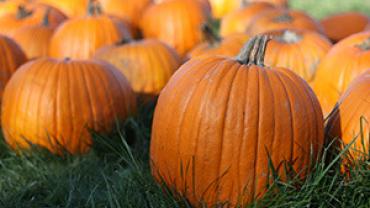
As the air gets cooler and leaves change color we start to become aware of the changing season. However it's not until the farmer's markets roadside stands and grocery stores start sporting bright orange pumpkins that we become fully immersed in the fall season.
Perhaps you purchase pumpkins for decorative carving or to beautify your home's landscape. You may even start thinking of pumpkin pies and festive family gatherings. Amidst all of this though we often forget that these multi-functional fruits (yes they are technically a fruit) are nutritional treasure pots that support good health and wellness.
Carving into the pumpkin's tough outer shell reveals the orange squash-like inner pulp. Before tossing this into the trash or adding it to the compost pile consider including it in your next meal. One cup of cooked mashed pumpkin will provide a whopping 14100 IUs of vitamin A. Vitamin A and its carotenoid derivatives continue to be at the forefront of various studies seeking to understand the connection between vitamin A and cancer. Its ability to regulate cell growth and differentiation as well as its high antioxidant properties makes it a sensible choice in this regard. Long-term clinical studies have shown vitamin A to be useful in age-related macular degeneration (AMD) a major cause of vision loss in elderly individuals. Antioxidant properties of vitamin A reduce oxidative stress which contributes significantly to the progression of AMD.
Alongside vitamin A significant amounts of antioxidants contained in vitamins C and E are also found in pumpkin. As a literal storehouse of antioxidant-rich nutrients pumpkin can be a valuable dietary tool in helping to prevent a myriad of health conditions such as heart disease and accelerated aging -all of which can be exacerbated by oxidative stress.
At only 49 calories per 1 cup serving pumpkin may be considered an optimal nutrient-rich food for healthy weight management. Within those few calories you will find nearly 3 grams of fiber and only 5 grams of sugar. The overall glycemic load for pumpkin is 3 meaning this food will not create an insulin reaction that will trigger lipogenesis. Therefore diabetics can enjoy this seasonal treat without worrying about unmanageable insulin levels.
More popular than the pumpkin pulp pumpkin seeds (also known as pepitas) are a favorite among many Americans and for good reason! Not only are they a tasty treat but they also have a nutritional profile that surpasses almost any other seed known to man. The protein profile alone makes pumpkin seeds shine. A mere 2 ounces of pumpkin seeds provides almost 17 grams of protein which is almost the equivalent of many animal-based proteins. As such a high protein snack pumpkin seeds are a great choice for growing children weight-conscious adults or dedicated bodybuilders just after a workout.
The micronutrient profile of pumpkin seeds is equally impressive. Every ounce of this nutritious snack provides good amounts of vitamin K iron magnesium phosphorus zinc copper and manganese. Inadequate magnesium intake is a growing problem in America especially among those with gastrointestinal issues type 2 diabetes and alcohol dependence. Deficiencies of this mineral are associated with a variety of conditions such as hypertension and cardiovascular diseases type 2 diabetes osteoporosis and even headaches. Pumpkin seeds are known to be one of the richest dietary sources of magnesium which not only supports the aforementioned health conditions but is also a powerful mineral that helps with relaxation and optimal sleep habits.
Pumpkin seeds are well-known for being a great source of zinc a mineral often lacking in American diets yet one that is vital to men's health. Zinc appears to play a role in maintaining a healthy prostate as a zinc deficiency increases a man's risk for oxidative DNA damage in prostate cells. A zinc deficiency was recently correlated to an increased risk for prostate cancer and potentially trumped the traditional PSA test in terms of identifying high-risk disease.
Any size pumpkin can be utilized as a nutritious addition to meals; however smaller pumpkins and pie pumpkins are often the preferred types for cooking and baking. Whether baked like squash mashed like potatoes or used as part of a creative casserole make this season especially healthy by serving pumpkin frequently and don't forget to roast the seeds for a quick nutritious snack.